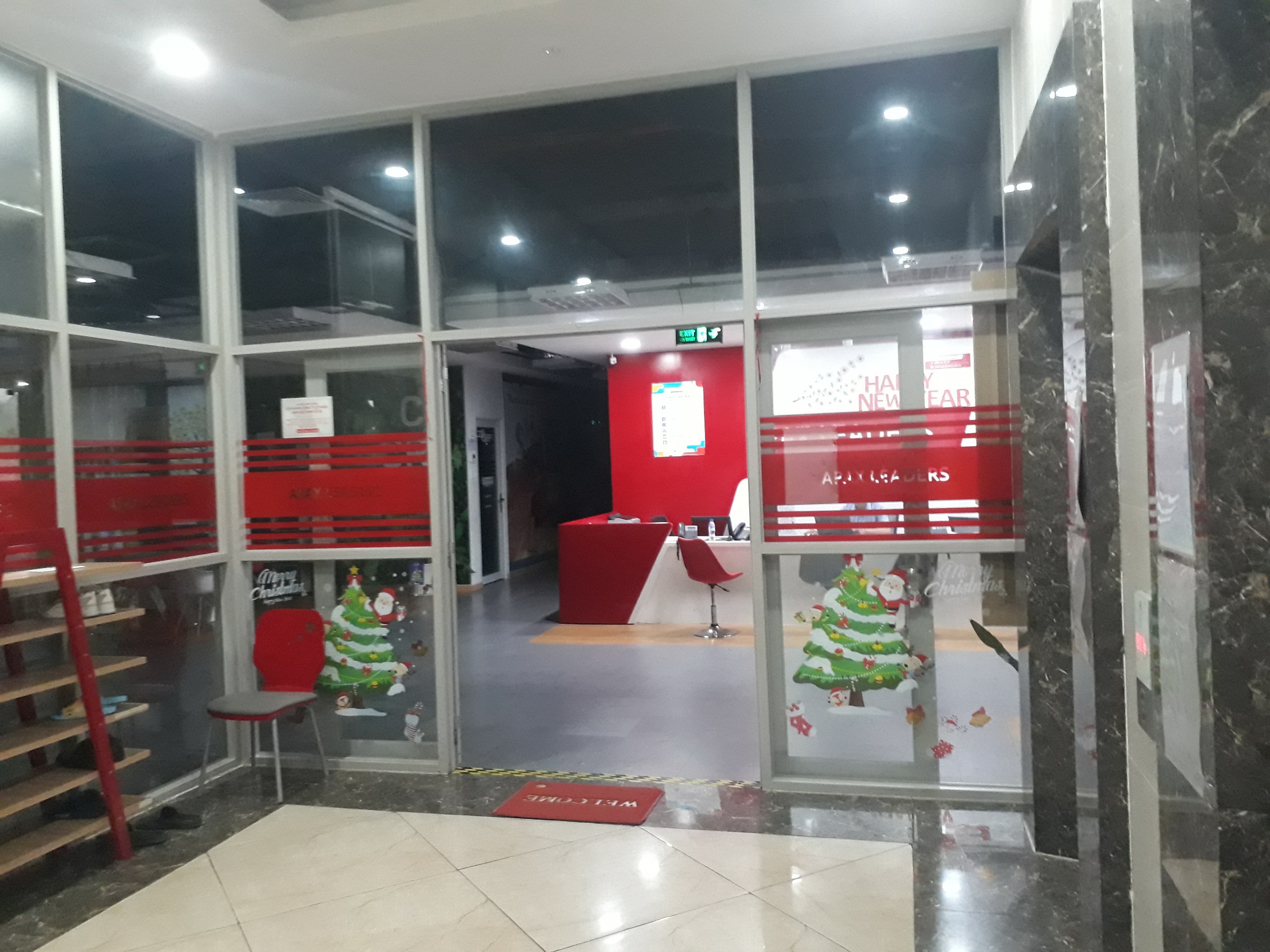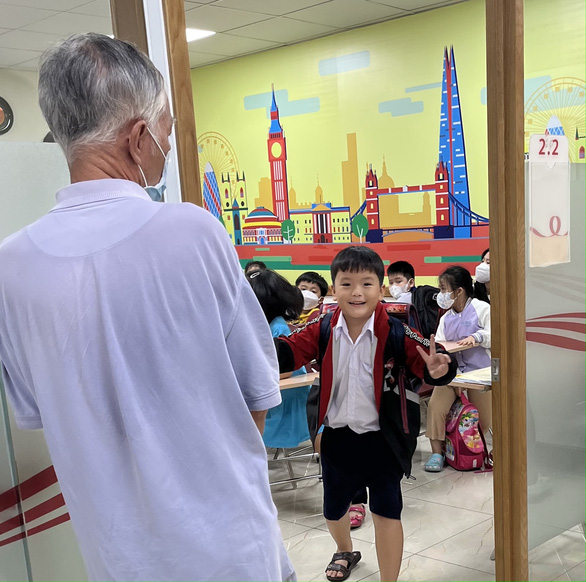Looking for the reasons behind the crisis among English language centers in Vietnam recently, some independent education experts said that the issue could be due to the centers being slow to adapt to the current trends in learning methods of today's learners.
While contemporary trends in foreign language learning are emerging both in Vietnam and the world, many Vietnamese English language centers seem to have fallen behind because they cannot adapt to the new waves of changes, independent experts told Tuoi Tre (Youth) newspaper.
The burden of office rent
One of the most recent scandals related to an English language center is that of Apax Leaders - an extremely well-known center about five years ago.
At that time, Apax Leaders impressed everyone with its rapid growth and expansion of branches across Vietnam.
However, the center's ongoing crisis reveals several obstacles that many other English centers are suffering from in the post-pandemic era.
In a conversation with Tuoi Tre, a deputy general director of a large educational group in Vietnam that offers English courses said that the huge office rent has put a heavy burden on the centers during the COVID-19 pandemic.
It costs each center thousands to hundreds of millions of dong (VND100 million = US$4,188) per month, depending on the total office space.
While center operators may cut their teachers' salaries because of the difficult financial situation, not all landlords are willing to cut rent out of sympathy for the centers.
With revenues near zero during the pandemic, the cost of office rent increased over the months.
By the time the English centers were allowed to reopen, many of them had owed billions of dong.
The deputy general manager said his group reduced the number of English centers by 40-60 percent, depending on the city and province, in the hope of lightening the burden of office rent.
"We are keeping only the centers with the highest number of students in each city or province. We closed the centers that made losses without continuing to wait for us to get more students, while the enrollment numbers have not changed at all," the person said.
The head of an office under the Ho Chi Minh City Department of Education and Training in charge of regulating English centers said one of the centers' most popular violations is changing locations.
Many enterprises stopped renting high-priced offices and moved to cheaper ones. They also used smaller spaces instead of large properties to save money without reporting it, the official said.
In another case, some companies share their offices with partners. They keep only some parts for teaching and sublet the rest for purposes other than teaching, although this is not allowed by law.
There are some centers that did not inform their learners about their relocation, which made customers feel insecure. This includes the story of Apax Leaders.
Some centers of this company have disappeared from Buon Ma Thuot City, located in the Central Highlands province of Dak Lak, Thu Duc City, and Phan Van Hon Street in District 12, Ho Chi Minh City.
A representative of Apax Leaders told Tuoi Tre that the centers have not vanished. They are just trying to reorganize their teaching centers and find offices with cheaper rents to save money, the representative claimed.
According to the representative, Apax Leaders' centers plan to return to normal operations from mid-October. In the meantime, he said, the company will provide appropriate methods to ensure student learning.
|
|
| The end of an English class in Ho Chi Minh City. Photo: Nhat Huy / Tuoi Tre |
A severe shortage of English teachers
As someone who constantly monitors foreign teacher recruitment activities in Vietnam, Rafael -- a teacher at the Vietnam-USA Society English Centers (VUS) -- said that in the last five years he has been living in Vietnam, he has never seen as many job postings for foreign English teachers as he has now.
Some online communities in Ho Chi Minh City have as many as 30,000 members, more than 10 of whom post a job posting per day seeking over 20 teachers for various levels of education.
"What worries me is that some English centers have agreed to lower their quality standards because of the shortage. In some centers, teachers are hired with expired or inappropriate degrees or certificates," Rafael said.
"Even worse, some small centers hire foreigners without degrees as teachers just because they can speak English, especially as teachers for kindergartens or elementary schools."
Nguyen Quoc Toan, general director of EQuest Education Group, also acknowledged that finding foreign teachers is a challenge for his company.
According to him, many foreign teachers have returned to their home countries during the last two years.
In the post-pandemic period, the demand for foreign teachers has increased according to the growing number of students, but Toan said there are some obstacles in the administrative procedures.
He said that it is currently extremely difficult for foreigners to apply for a work permit. For this reason, many foreign language centers cannot afford to hire enough foreign teachers.
"Authorities should take flexible measures and streamline procedures regarding this situation. In this way, the problem of teacher shortage could be solved soon," suggested Toan.
P., who used to be an operations manager at ILA, one of the largest language service providers in Vietnam, and now works as an employee at a private school in District 7, Ho Chi Minh City, said the dearth of English teachers is a problem of systematic management.
The centers that opened before the COVID-19 pandemic still face many problems, both in recruitment and training. Therefore, according to P., they are confronted by more problems employing more new teachers.
In contrast, centers that have existed for many years and have a more stable capacity for human resource management stand a better chance of survival despite the shared challenges posed by the pandemic.
According to Truong Kieu Trinh, who studied education at the UK's Sheffield Hallam College, many language providers in Vietnam tend to focus on commercial aspects rather than education.
To this end, they simply want to hike the number of centers as quickly as possible. They spend money on marketing and increasing sales to attract as many learners as they can.
They also use the lion's share of their revenue to open new venues. It is thus not sure that they have quality teachers and the capacity for service delivery and fiscal management.
"If the products they offer exceed their capabilities, they can no longer guarantee their quality and risk collapse," Trinh said.
"It is extremely important that new products should be first tested on a limited scale before being sold on a larger scale.
"The business of education has its own special characteristics that require sustainability and stability rather than instant wealth."
The need to adapt to new trends
According to independent education expert Bui Khanh Nguyen, learning trends in Vietnam and worldwide have changed greatly after the COVID-19 pandemic, but many Vietnamese English centers do not seem to be adapting to these changes.
Nguyen believes that the models of traditional classes such as huge buildings with ample space are no longer appropriate nowadays.
After the pandemic, it has been shown that such traditional models cost too much while the benefits are not commensurate. This has led to a huge discrepancy between the investment and the number of students enrolled in the post-pandemic period, Nguyen said.
For Nguyen, there are many students who can learn online. Many of them gained the ability to learn over the Internet during the coronavirus crisis and abandoned conventional classes.
Instead of going to class for an hour and returning home, they can use that one hour to take an online course.
In Vietnam, many major English course providers such as the British Council, Apollo English, and IvyPrep Education have introduced online courses for learners of all ages.
A representative of one of these providers even told Tuoi Tre that about 70 percent of its revenue comes from online courses.
According to an executive in charge of recruitment at VUS, today's English centers face stiff competition not only from other centers in the same industry but also from language learning apps that have gained prominence in recent years.
It is necessary to combine online and offline courses for English centers, the manager said.
Depending on the time when classes are offered, centers can decide on the proportion of online and offline units, but they must not offer only offline courses, as they do now, he added.
Some English centers disappeared along with tuition
In October 2021, many clients who were parents of learners reported to newspapers that the Pixar Center in Ho Chi Minh City was collecting their tuition irregularly.
Some of them paid tuition to the center without receiving a refund, despite talking to it several times.
In March 2022, clients filed complaints against the Pixar Center with the District 12 People's Court, and the court accepted some of their complaints.
In late 2021, many Saigon American English centers in some cities and provinces closed unexpectedly.
In Ho Chi Minh City, thousands of students who had paid tens of millions of dong were disappointed to learn that the center had been closed.
Not only the parents of the students but also the teachers who worked for the center had to complain to the local police about the problem.
Like us on Facebook or follow us on Twitter to get the latest news about Vietnam!



















































